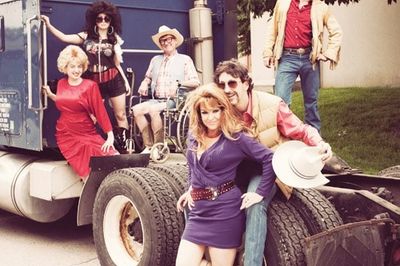From 1997 through 2007, Kansas City’s gay community boasted a cultural institution that many larger cities would have coveted. Inspired in part by the antics of Charles Ludlam’s Ridiculous Theatrical Company in New York and propelled by a late-20th-century vogue for parodying the melodramatic pretense of earlier decades, the Late Night Theatre company delighted the city with a steady supply of theatrical subversion.
Valley of the Dolls, 9 to 5, The Birds and other classics of low — and high — culture were all placed under Late Night’s parodic microscope, with female roles almost always played by men in drag. And many times, the company presented original works designed to send up entire genres of popular entertainment.
Writer, director and actor David Wayne Reed’s Mother Trucker, a take on the popular trucker movies of the 1970s and ’80s, was one of the most successful of these, and that show will get the sequel treatment later this month.
Though it is not a Late Night Theatre production per se, Mother Trucker 2: Ride On, continues the lives of the characters Reed created in his 2004 Late Night original. Among these are pink Peterbilt-driving trucker Ruby Lee Jenkins and her crippled son Teddy Bear; Ruby’s brother Slim (played by Reed), an aspiring country-western singer; and an assortment of other “red state characters,” as Reed described them during a recent interview attended by several of his Mother Trucker 2 castmates.
Reed, who grew up on a farm in Louisburg, Kan., and holds a theater degree from Kansas State University, became involved with Late Night Theatre in 1997 with its inaugural production, an all-male adaptation of Hitchcock’s The Birds that played at Westport CoffeeHouse. Reed, along with Mother Trucker 2 castmates Gary Campbell (who plays Teddy Bear) and Darryl W. Jones (who plays Dick E. Walker, “a cop with a grudge”) remember their Late Night Theatre days, and nights, affectionately.
“It was [local actor and producer> Ron Megee’s vision,” Reed says of the Late Night aesthetic. “However, Ron was always very good about not taking that all on himself — it wasn’t all about wearing that title. Ron always wanted to create a theatre that was just about his friends having fun. … It always had that family spirit and it always had that kind of rock-and-roll band spirit about it too, because we were just like this kind of transient band of trannies.”
From Westport, the company moved to its first permanent home, the Old Chelsea, a former porn palace in Kansas City’s River Market district. Here is where the real work of Late Night began.
“They gave us a year and a half in there rent-free,” Reed says of the company’s tenure at the Old Chelsea. “Now, we had to go in there and clean, clean a porn palace. … We literally hand-scrubbed all of the seats. … I often joke with Gary that dressing up as a woman made me a man. You know, it was such a brotherhood. … Seeing Ron Megee in heels and a sequin dress and a power tool is a sight to behold.”
After several successful seasons at the Old Chelsea, there was a move to the West Bottoms, which is fondly remembered as a venue sans bathrooms (the cast took to relieving themselves in buckets of kitty litter). Late Night Theatre finally found a permanent home on Grand Avenue, in a space now occupied by Czar Bar. Here is where the company was finally able to establish a sense of permanence.
At the Grand Avenue space, “We’re like, ‘We’re gonna get legitimate,’” Reed says of what would be the company’s last home. “We became a nonprofit, we established a board. … We really went through all the business paces at that time, and we were really successful. I mean that [the Grand Avenue space"> really became our home.”
The Grand Avenue space was where Reed took on more creative roles. “For 2004 and 2005, that’s when I kind of assumed … a lot more writing responsibilities, which was wonderful. Ron is so great about encouraging new talent, letting them go.
“I wrote and directed four shows for Late Night,” Reed says. These included the 9 to 5 parody, a take on Prince’s Purple Rain, and of course the original Mother Trucker.
In early 2007, skyrocketing rent and mounting debt forced Late Night to close.
Ron Megee spoke about the famed Late Night aesthetic in the April 2010 cover story in Camp: “We always went to the pop culture of the moment, or things to maybe slap people a little bit and [make them"> wake up, or look at their life in a different light. We had men playing women, women playing men. We looked at TV shows, movies, we looked at moments that could be politically incorrect, to hold up a mirror up to society.”
Certainly, Mother Trucker falls in well with this Late Night mission statement, and yet, in some respects, it supersedes it. “This show was not Valley of the Dolls
